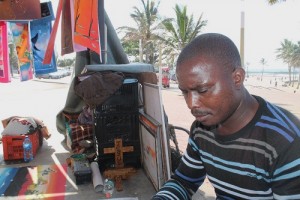Thousands of African immigrants, who fled the communities they had lived in following xenophobic attacks in parts of KwaZulu-Natal and Johannesburg, were repatriated last week. Those who chose to remain have taken their chances in returning to the communities where they lost their possessions, homes and businesses. MOSES MATACHE told Qiniso Mbili about his experience as a Malawian residing in South Africa.
I am from Malawi and I am 37 years old; I got to South Africa in 2006, looking for greener pastures. My older brother, who once used to work in South Africa, advised me to come work here. It was a much sunnier place back then.
I used to paint drawings as a hobby back home, but there isn’t a market for it back there. Here I can do it for a living. I come from an extremely poor household, but since I got here, the situation has been improving.
My neighbours know who I am and where I am from, but they’ve never attacked me. Because of this I know they must be thinking that xenophobia doesn’t affect me.
Unlike my compatriots, I haven’t stopped selling my drawings, even at the peak of xenophobia. I have never been physically or verbally attacked, but xenophobia has been affecting my business badly. My main customers are mostly tourists and since the xenophobic attacks, South Africa has become an undesirable place for foreigners to visit.
Before, I would sell three to four paintings on a bad day, and eight to 10 on a good day. Now it is a good day when I sell two, because on most days no one buys at all.

My paintings cost around R300 on average and I have been able to send R2,000 back home every month to support my mother and two children. This month I had to send R1,000 because I didn’t make much from the drawings. I have started using up my savings. This means that my family back home has to make drastic lifestyle changes.
Even if xenophobia ends right at this moment, it is still going to take a while for things to go back to normal for my business. That is a sad fact for me because I cannot live on my savings for much longer.
It would only make sense if prices of products and services offered by resistant foreigners, like me, would eventually go up. This is a dangerous place for a foreigner to live and work in. These days when I’m in a taxi home, I do my best not to talk to anyone so that my imperfect Zulu will not be detected.
I have since expanded my business to other markets where, although it is slow, it is better than here. I am now working harder to save up enough to go back home with something. I have a child here in South Africa and when I leave, I will make sure to leave with him. I will also discourage him to come here once he is grown; this is a cruel country.

![Moses Matache paintings [slider]](https://www.thedailyvox.co.za/wp-content/uploads/2015/05/Moses-Matache-paintings-slider.jpg)







